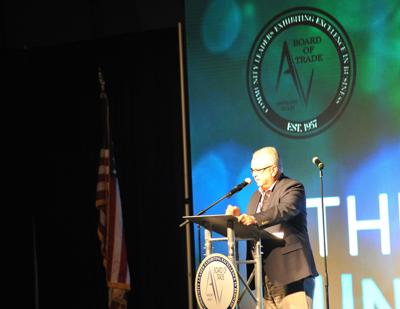 Development and application of cutting edge technology and implementation of innovative practices will continue in the High Desert well into the future. The Antelope Valley Board of Trade highlighted some of these best practices and predictions for the future at their annual Business Outlook Conference held Feb. 22 at the Antelope Valley Fairgrounds.
Development and application of cutting edge technology and implementation of innovative practices will continue in the High Desert well into the future. The Antelope Valley Board of Trade highlighted some of these best practices and predictions for the future at their annual Business Outlook Conference held Feb. 22 at the Antelope Valley Fairgrounds.
Speaking to the theme of “The Future: Unleashed” a trio of elected officials representing state kicked off the general session portion of the conference.
“Too often people fail to recognize the true gift we have here in the Antelope Valley,” said
California Assemblyman Tom Lackey. “We have so much talent here, but one of the things that excites me about this conference is that we’re able to find the common ground and common interests.”
Raised in Boron and first elected to represent the 34th Assembly District in 2014, Lackey said one of the greatest strengths to capitalize on in the area is aerospace.
“I’ve seen the great gift of aerospace technology,” he said. “We have billions of dollars invested here in the Antelope Valley. We have the expertise to rival anyplace in the world as it relates to aerospace.”
Lackey proposed creation of an aerospace institute in the High Desert.
“The purpose of that institute would be to gather some of the greatest minds that exist as it relates to the aerospace industry,” he said. “We want to hope to capitalize on that.”
Lackey said there would be a big announcement concerning the creation of the institute in the near future.
“This institute will be here and it’s the beginning of something very, very exciting and it’s something that all of you are going to benefit from.”
California Senator Scott Wilk said he was excited to share some of the developments in Sacramento as it relates to the High Desert.
“You can’t unleash the future until you have a solid foundation in the present,” he said.
Quoting from the 2001 management book Good to Great: Why Some Companies Make the Leap…and Others Don’t, Wilk talked about confronting brutal facts in order to be a success.
“I’m proud of the fact, here in the Antelope Valley, our civic leadership has confronted the brutal facts,” he said.
Representative of the 21st Senate District, Wilk said one of the brutal facts in the state of California relates to the economy.
“You will hear out of Sacramento the fact that we have the fifth largest economy in the world, and that’s true. What they won’t tell you is that our net worth is negative $127.2 billion.”
The ramifications of having a negative net worth at the state level is a lack of funding for possible improvements and projects, according to Wilk.
“We’re not going to be getting a CSU (California State University) system anytime soon and the Antelope Valley Freeway is not going to be widened to four lanes each way.”
Working to build a sustainable community is also important, according to Wilk
“To me, that looks like being environmentally sound, protecting and improving our quality of life and, obviously, economic growth,” he said.
On the environmental front, Wilk noted that Lancaster is already one of the first net-zero cities in America – meaning the total amount of energy used on an annual basis is roughly equal to the amount of renewable energy created on site – and Antelope Valley Transit is one of the first agencies with all electric bus service.
“In terms of economic growth, I believe in a diversified economy – but we really need to double-down on aerospace,” he said. “We have the talent, we have the infrastructure and I think it’s going to be a boon to our area.”
Wilk also proposed the production of industrial hemp in the High Desert as a way to improve and diversify the economy. Senate Bill No. 1409, introduced by Wilk, amended the Food and Agriculture Code and Health and Safety code regarding the growth of industrial hemp and was approved by Gov. Jerry Brown in 2018
“Industrial hemp is not cannabis, they’re cousins and they’re both weed, but you could smoke industrial hemp all day and not get high,” he said. “Industrial hemp has been a fabric of America since the beginning. Thomas Jefferson drafted the Declaration of Independence on hemp paper and Betsy Ross weaved the first flag with hemp.”
With the potential use in more than 25,000 different products, its ability to capture carbon to help meet green house gas emission standards, relatively low water use and its ability to detoxify and regenerate the soil industrial hemp could help with creating jobs in the High Desert.
“First, our farmers are going to be able to continue to farm; secondly, the whole world is growing hemp and using it in products,” Wilk said.
Newly elected United States House of Representatives Congresswoman Katie Hill said that while her time in Washington D.C. has been short, it’s been relatively productive. Her assignments include serving on the House Armed Services; Oversight and Reform and Science, Space and Technology Committees.
“From the moment I arrived in Washington, my goal was to change the conversation from gridlock as usual to how do we move forward together,” said Hill. “This isn’t about partisan politics anymore. This is about how are we going to do what’s best for our community.”
The challenge is determining how best to invest in cutting edge technology “and, most importantly how do we make sure our community and America remains safe, secure and the world leader it’s always been. Let’s start right here in the Antelope Valley.”
Hill said she was part of a delegation that recently met with leaders from the European Union and NATO at the Munich Security Conference.
“There’s no way to talk about national security without referencing the incredible work that takes place right here in the AV,” she said. “The innovation the occurs here and the powerful partnerships between our business community, our military community and our residents is exactly what makes this the hub of the future.”
While in the High Desert Hill toured U.S. Air Force Plant 42, Northrup Grumman and Lockheed Martin and NASA’s Armstrong Flight Research Center.
“Artificial intelligence, clean technology and green transportation infrastructure are a few of the scientific advancements that will redefine our economy in the coming decade,” said Hill. “
“On the Science, Space and Technology Committee, I have the opportunity to help bridge the gap between discovery, commercialization and democratization, ensuring that the benefits of innovation reaches our communities in the Antelope Valley.
“Finally, you can’t talk about unleashing the future, our local economy or. national security without having a serious discussion about our environment on our economy. Green technology is the only solution that makes sense for national and economic security as well as our health and well-being.”
